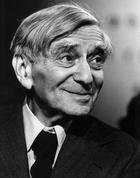
Vladimir Jankélévitch (Bourges, 1903 - Paris, 1985) philosopher and musicologist, was born into a family of Russian intellectuals, who was forced to emigrate to Paris fleeing anti-Semitism in their country of origin. In 1922 he entered the École Normale Supérieure to study philosophy. A year later he meets Henri Bergson who maintain remarkable correspondence throughout his life. From 1926-1932 a professor at Caen, Lyon, Toulouse and Lille. Under the Vichy regime, is deprived of nationality and deposed. Enter the Resistance in 1941. It is during this period that begins its long essay Death (Pre-Texts, 2002). In his controversial long text, I imprescriptible, Jankélévitch raises the impossibility to cancel the genocide, which marked psychologically and culturally the final decade of the twentieth century. In 1947 returns to its position at the University of Lille. From 1951-1979, he holds the chair of moral philosophy at the Sorbonne. He was openly committed to the problems of his time.




